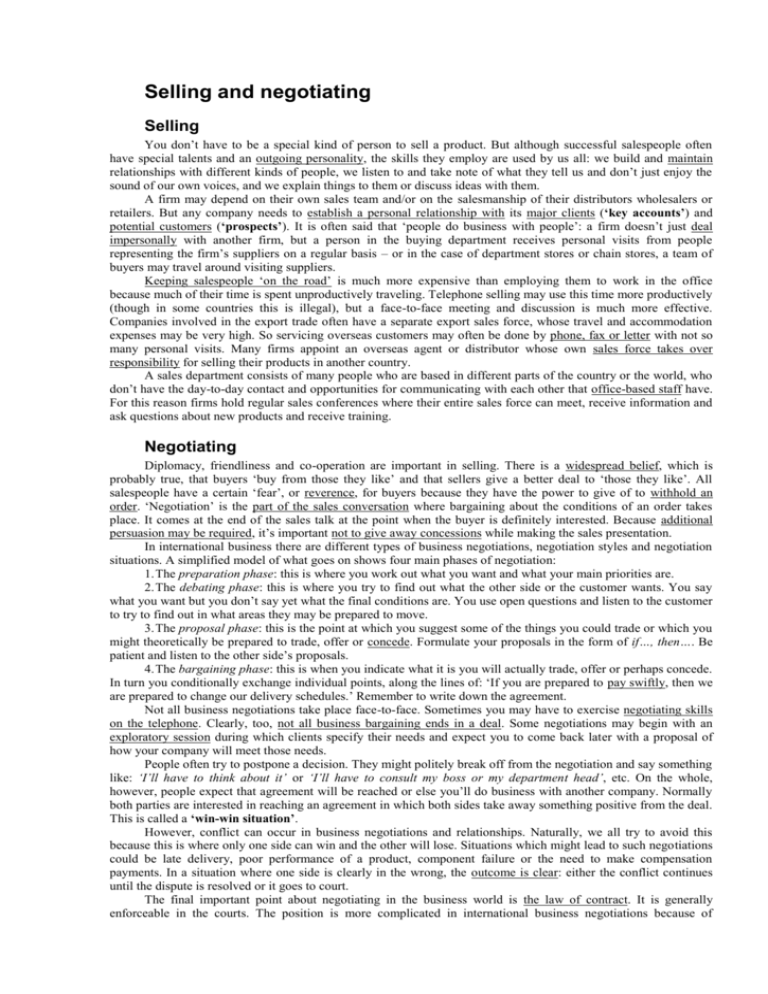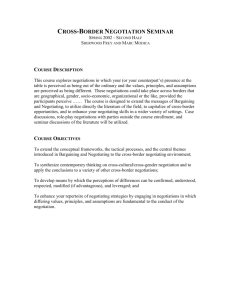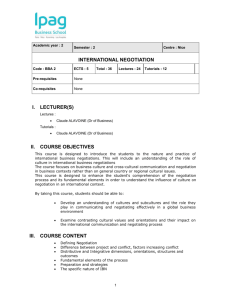Selling and negotiating
advertisement

Selling and negotiating Selling You don’t have to be a special kind of person to sell a product. But although successful salespeople often have special talents and an outgoing personality, the skills they employ are used by us all: we build and maintain relationships with different kinds of people, we listen to and take note of what they tell us and don’t just enjoy the sound of our own voices, and we explain things to them or discuss ideas with them. A firm may depend on their own sales team and/or on the salesmanship of their distributors wholesalers or retailers. But any company needs to establish a personal relationship with its major clients (‘key accounts’) and potential customers (‘prospects’). It is often said that ‘people do business with people’: a firm doesn’t just deal impersonally with another firm, but a person in the buying department receives personal visits from people representing the firm’s suppliers on a regular basis – or in the case of department stores or chain stores, a team of buyers may travel around visiting suppliers. Keeping salespeople ‘on the road’ is much more expensive than employing them to work in the office because much of their time is spent unproductively traveling. Telephone selling may use this time more productively (though in some countries this is illegal), but a face-to-face meeting and discussion is much more effective. Companies involved in the export trade often have a separate export sales force, whose travel and accommodation expenses may be very high. So servicing overseas customers may often be done by phone, fax or letter with not so many personal visits. Many firms appoint an overseas agent or distributor whose own sales force takes over responsibility for selling their products in another country. A sales department consists of many people who are based in different parts of the country or the world, who don’t have the day-to-day contact and opportunities for communicating with each other that office-based staff have. For this reason firms hold regular sales conferences where their entire sales force can meet, receive information and ask questions about new products and receive training. Negotiating Diplomacy, friendliness and co-operation are important in selling. There is a widespread belief, which is probably true, that buyers ‘buy from those they like’ and that sellers give a better deal to ‘those they like’. All salespeople have a certain ‘fear’, or reverence, for buyers because they have the power to give of to withhold an order. ‘Negotiation’ is the part of the sales conversation where bargaining about the conditions of an order takes place. It comes at the end of the sales talk at the point when the buyer is definitely interested. Because additional persuasion may be required, it’s important not to give away concessions while making the sales presentation. In international business there are different types of business negotiations, negotiation styles and negotiation situations. A simplified model of what goes on shows four main phases of negotiation: 1. The preparation phase: this is where you work out what you want and what your main priorities are. 2. The debating phase: this is where you try to find out what the other side or the customer wants. You say what you want but you don’t say yet what the final conditions are. You use open questions and listen to the customer to try to find out in what areas they may be prepared to move. 3. The proposal phase: this is the point at which you suggest some of the things you could trade or which you might theoretically be prepared to trade, offer or concede. Formulate your proposals in the form of if…, then…. Be patient and listen to the other side’s proposals. 4. The bargaining phase: this is when you indicate what it is you will actually trade, offer or perhaps concede. In turn you conditionally exchange individual points, along the lines of: ‘If you are prepared to pay swiftly, then we are prepared to change our delivery schedules.’ Remember to write down the agreement. Not all business negotiations take place face-to-face. Sometimes you may have to exercise negotiating skills on the telephone. Clearly, too, not all business bargaining ends in a deal. Some negotiations may begin with an exploratory session during which clients specify their needs and expect you to come back later with a proposal of how your company will meet those needs. People often try to postpone a decision. They might politely break off from the negotiation and say something like: ‘I’ll have to think about it’ or ‘I’ll have to consult my boss or my department head’, etc. On the whole, however, people expect that agreement will be reached or else you’ll do business with another company. Normally both parties are interested in reaching an agreement in which both sides take away something positive from the deal. This is called a ‘win-win situation’. However, conflict can occur in business negotiations and relationships. Naturally, we all try to avoid this because this is where only one side can win and the other will lose. Situations which might lead to such negotiations could be late delivery, poor performance of a product, component failure or the need to make compensation payments. In a situation where one side is clearly in the wrong, the outcome is clear: either the conflict continues until the dispute is resolved or it goes to court. The final important point about negotiating in the business world is the law of contract. It is generally enforceable in the courts. The position is more complicated in international business negotiations because of differences in laws and assumed liabilities. But, nevertheless, the courts are a source for remedies if contracts are broken. Suing defaulting contractors is quite common. A sound knowledge of contract law is therefore essential for negotiators drawing up an agreement at the end of a deal. However, this is the point at which the experts will usually have to be called in and so is not dealt with further here. Outgoing personality Отложить Postpone Отзывчивый человек Impersonal Переговоры Negotiation Безлично Переговоры по Assume Sales conversation Брать на себя продаже Персонал, Swiftly располагающийся в Office-based staff Быстро офисе Bargaining По очереди In turn Ведение переговоров Поддерживать Keep salespeople ‘on the Взаимовыигрышная Win-win situation деятельность road’ ситуация продавцов ‘в пути’ Potential customers, Взять на себя Потенциальные Take over responsibility Prospects ответственность клиенты Возбуждать дело Sue defaulting против стороны, не Enforce Проводить в жизнь contractors выполнившей обязательство Employ Продавцы Sales force Использовать Исследовательское Exploratory session Сделка (торговая) Bargain совещание Ключевая выгода, Key account Составлять Draw up ключевое мнение Средство судебной Law of contract Remedy Контрактное право защиты Face-to-face Уважение Reverence Лицом к лицу Личные Personal relationship Условно Conditionally взаимоотношения Not to give away Concede Не делать уступок Уступать concessions Sound knowledge of Хорошее знание Обрывать переговоры Break off the negotiation contract law контрактного права Однотипные Распространённое Chain stores Widespread belief розничные магазины мнение Отказывать в чёмWithhold либо Co-operation and competition in negotiating Negotiations are complex because one is dealing with both facts and people. It is clear that negotiators must above all have a good understanding of the subject. They must also be aware of the general policy of the company or institution in relation to the issues and they must be familiar with the organizational structure and the decisionmaking process. However the awareness of these facts may not necessarily suffice to reach a successful outcome. Personal, human factors must be taken into account. The approach and strategy adopted in negotiating are influenced by attitude as well as by a cool, clear logical analysis of the facts and one’s interests. The personal needs of the actors in negotiating must therefore be considered. These can include a need for friendship, goodwill, credibility, recognition of status and authority, a desire to be appreciated by one’s own side and to be promoted and, finally, an occasional need to get home reasonably early on a Friday evening. It is a well-known fact that meetings scheduled on a Friday evening are shorter then those held on other times. Timing can pressure people into reaching a decision and personal factors can become part of a bargaining process. Researchers who have studied the negotiating process recommend separating the people from the problem. An analysis of negotiating language shows that, for example, indirect and impersonal forms are used. This necessity to be hard on the facts and soft on the people can result in the something complex, almost ritualistic, style of negotiating language. Language varies according to the negotiating style. In negotiating you can use either a co-operative style or a competitive one. In the co-operative style the basic principle is that both parties can gain something from the negotiation without harming the interests of the other. Or in other words that both parties will benefit more in the long run in friendship and co-operation even if they make some concessions. This type of negotiation is likely to take place in-house between colleagues and departments, or between companies when there is a longstanding relationship and common goals are being pursued. Unfortunately co-operative style negotiations without a trace of competition are rare. In most negotiation situations there is something to be gained or lost. There can be a danger in adopting a cooperative mode, as unscrupulous people may take advantage of cooperative people. The opposite mode to co-operative negotiating is competitive negotiating. Negotiators see each other as opponents. Knowledge of the other party’s needs is used to develop strategies to exploit weaknesses rather then to seek a solution satisfactory to both sides. This type of negotiating may be appropriate in the case of one-off contracts where the aim is to get the best result possible without considering future relationships or the risk of a breakdown in negotiations. Needless to say, the language in this type of discussion may become hostile and threatening even if it remains formal. In reality most negotiations are complex blend of co-operative and competitive mode. Negotiating successfully implies dealing appropriately with the four main components of any negotiation: facts, people, competition, co-operation. Skilled negotiators are sensitive to the linguistic signals, as well as the non-verbal ones of facial expressions, gesture, and behavior, which show the type of negotiating mode they are in. Language reflects tactics and therefore a study of the language used in negotiating brings a greater awareness of the negotiating process.







